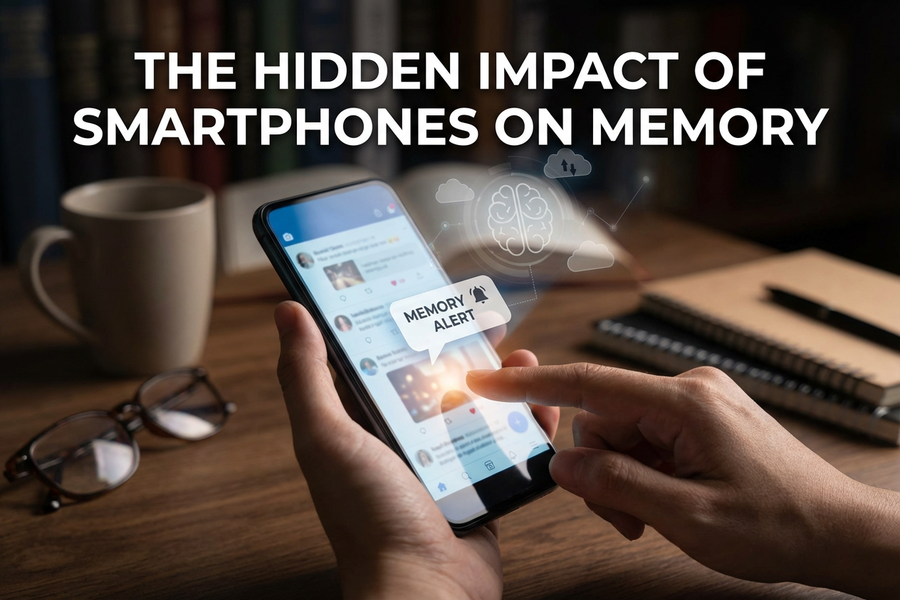Smartphones have become a constant companion for students. They help with communication, online classes, quick searches and entertainment. But while phones make life easier, many students don’t realise that their device also influences the way their brain remembers information. The hidden impact of smartphones on memory is subtle. It builds slowly and affects learning, focus and long-term recall without students even noticing.
Understanding how smartphones influence memory is important because memory is the core of learning. Whether it’s remembering formulas, understanding concepts or preparing for exams, students rely on their brain’s ability to store and retrieve information. This article explains the science behind smartphone use and how it shapes memory in daily life.
Harvard research on attention and memory
How the Hidden Impact of Smartphones on Memory Starts With Attention
Before information becomes a memory, it must first receive attention. Smartphones compete for attention through notifications, vibrations and constant updates. Even if the phone is placed face down, the mind stays alert, waiting for the next sound or buzz.
Researchers found that simply having a smartphone on the desk can reduce focus. This happens because the brain uses extra energy to ignore the phone. When attention becomes fragmented, memory becomes weaker. This is one of the earliest signs of the hidden impact of smartphones on memory.
How Smartphones Affect Short-Term and Long-Term Recall
Short-Term Memory Challenges
Short-term memory is responsible for holding small amounts of information for brief periods. When students switch between studying and checking their phones, the brain loses its ability to maintain information. Constant switching reduces the strength of short-term memory and makes learning feel scattered.
Long-Term Memory Weakness
Long-term memory forms when the brain processes information deeply and without interruptions. Every alert or message breaks this process. As a result, even students who study sincerely may struggle to remember what they learnt. This gradual weakening is a major part of the hidden effects smartphones have on the brain.
Digital Dependence and Natural Memory Decline
Students rely on their phones for reminders, schedules, notes and even formulas. This habit is known as digital offloading. While convenient, it means the brain is practising memory less often. Just like muscles weaken without use, memory weakens when replaced with digital assistance.
Examples include:
-
forgetting phone numbers
-
relying on screenshots instead of memorising
-
depending on apps for simple facts
This dependence reduces natural memory strength and contributes to long-term learning difficulties.
Instant Rewards and Slow Learning
Smartphones train the brain to expect instant rewards. Social media likes, quick messages and short videos give immediate stimulation. However, studying requires slow, focused effort. This contrast makes learning feel less interesting to a brain trained for speed.
When attention becomes impatient, the brain struggles to store information deeply. Students may revise lessons repeatedly but still fail to remember them during exams. This is another subtle impact that builds over time.
How Smartphones Disrupt Sleep and Memory Formation
Sleep is essential for memory. During sleep, the brain organises information and strengthens connections. But late-night scrolling delays sleep and reduces sleep quality. Screens emit blue light that lowers melatonin, the hormone responsible for healthy sleep cycles.
Poor sleep affects:
-
concentration the next day
-
memory formation
-
retention during revisions
-
recall during exams
Students often blame themselves for forgetting, but sleep disruption caused by smartphone use is a major reason.
Why Students Forget What They Study
Many students experience this pattern:
They study well → they revise → they understand → but forget in the exam.
This happens because the brain never gets uninterrupted time to store information properly. Distraction weakens encoding. Weak encoding leads to poor recall. The device may not look harmful, but its constant presence impacts memory much more than students realise.
The Psychology of Digital Distraction
Neuroscientists explain that every time a student checks their phone, the brain switches attention. Even a quick glance requires the brain to reset focus. This “attention switching” reduces productivity and memory capacity. Over time, the brain becomes used to shallow focus, making deep learning challenging.
This psychological shift is one of the strongest signs of the hidden impact of smartphones on memory, especially in students who multitask during study hours.
Reducing the Cognitive Effects of Smartphone Use
Students do not need to give up smartphones. They only need to develop healthier habits. These steps protect memory without disrupting digital life:
1. Keep the phone away while studying
Distance increases focus and reduces temptation.
2. Use airplane mode during study sessions
This creates uninterrupted learning time.
3. Avoid screens before bedtime
This improves sleep quality and memory consolidation.
4. Write things down by hand
Handwriting strengthens memory better than typing or taking screenshots.
5. Set clear screen-time rules
Separating study time and phone time helps the brain stay organised.
6. Disable non-essential notifications
Less noise means more focus.
7. Take short digital breaks
Resting the mind improves memory performance.
These habits help reverse many of the hidden effects of smartphone use.
The Broader Effects on Student Learning
Smartphones influence more than just memory. They affect learning speed, attention span, emotional balance and productivity. When students learn to control phone habits, they gain:
-
sharper recall
-
better exam performance
-
improved focus
-
stronger mental energy
-
more efficient study sessions
Healthy digital behaviour leads to healthy memory growth.
Final Thoughts
Smartphones are powerful, helpful tools, but they also shape the brain in ways students don’t always notice. The hidden impact of smartphones on memory affects focus, sleep, attention and long-term recall. However, with balanced habits, students can enjoy technology without harming their learning. A mindful approach helps students protect their memory, improve concentration and study with confidence.
Also Read: The Silent Epidemic: Academic Burnout in Indian Students



